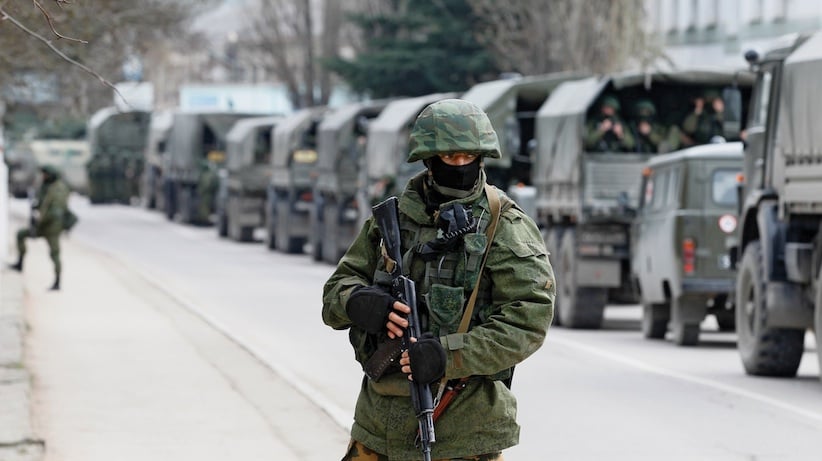Editorial: Advice for the year of the referendum
In a world of separation anxiety, a few kind words for large, complicated, multi-ethnic, hard-to-manage nation-states
Armed servicemen wait in Russian army vehicles outside a Ukranian border guard post in the Crimean town of Balaclava March 1, 2014. (Baz Ratner, Reuters)
Share

Three months in, and 2014 is quickly shaping up to be the year of the separation referendum.
On Sunday, in a vote universally denounced in the West as illegitimate, Crimea voted 97 per cent to secede from Ukraine. It was then promptly annexed by Russia. Also this week, citizens in Venice and the surrounding region of Veneto are holding a vote that, if successful, proposes to initiate negotiations on separating from Italy. Scotland will hold a referendum in September on whether to exit the United Kingdom. Catalonia, a perpetually restive region of Spain, plans to hold a similar vote this coming November.
Here at home, of course, Quebec is in the midst of a provincial election widely considered to be a referendum on holding another referendum. If the Parti Québécois achieves a sufficiently impressive majority we can expect a third attempt at removing Quebec from Canada in short order.
The map of the world has always waned and fluxed. Borders drawn for largely arbitrary reasons, such as those of the former Yugoslavia, inevitably fail since the resulting states prove impossible to govern. But not since the postwar era has so much change threatened so much of the globe in such a short period of time.
While the Crimean peninsula merely swapped flags, all the other extant separatist movements seek their independence from countries of long-standing historical significance. Now many are claiming the era of the sovereign, indivisible nation-state unified by a common cultural, political and economic system—a concept dating back to the 1600s—has outlived its usefulness. Will the 21st century be marked by a shattering of nation-states into innumerable tribal communities? If so, is it a good thing?
Having lived through this twice before, Canadians instinctively know it’s a mistake to give up on the concept of country without a fight. So before everyone and their neighbour declare themselves independent, it’s worth pointing out the great and varied advantages to life within a big, accommodating nation.
The traditional nation-state remains the best guarantor of economic success, political liberty and international status in good and bad times. Large, diverse economies provide a crucial form of insurance for all citizens and regions within. This is especially obvious in Canada, where a booming Alberta has kept the rest of the country afloat by soaking up excess labour and throwing off ample tax revenues. Someday, perhaps, the situation will reverse itself and the rest of Canada will take its turn propping up Alberta. (In the meantime, Quebecers might want to remind themselves where their $7.8 billion in annual equalization payments comes from.)
Large nations with economies and populations to match are also better able to project their interests worldwide, defend themselves against aggression and attract international investment, not to mention win gold in Olympic hockey. Prospective new countries such as Scotland, Catalonia, Venice or Quebec risk turning themselves into international minnows for the sake of cultural homogeneity.
Minority rights are also most convincingly protected within countries that have a sufficiently diverse population to give voice to such needs. Entities defined solely by narrow ethnic or linguistic characteristics will inevitably find it more difficult to tolerate internal minorities or external neighbours. The postwar period should be seen as a testament to the ability of major nations to live in peace with each other.
Yet some commentators claim we’d be better off doing away with nations altogether. In his new book If Mayors Ruled the World: Dysfunctional Nations, Rising Cities, author Benjamin Barber claims only cities have the ability to solve the world’s biggest problems, such as the environment, immigration and economic stagnation. Such a reductionist approach to governance seems the stuff of pure comedy. If several dozen world leaders can’t agree on what to do about climate change, how likely are several thousand squabbling, parochial-minded mayors to find common cause?
Perhaps the most significant benefit of the nation-state is its ability to accomplish grand, impossible-to-imagine projects. Consider that in 1492 Venice represented the pinnacle of commerce, trade, art and science, and was arguably the richest city in the world. Yet it was Spain, a country just newly liberated from the Moors, that mustered the economic capacity, vision and ambition to send Columbus across the Atlantic in search of glory. Similarly, it is absurd to imagine Vancouver, Toronto or Montreal on its own undertaking a continental railway line to connect British Columbia with the rest of Canada in the 1880s. No city has ever sent a human into space.
A world without nation-states is a world incapable of dreaming big. That alone should be sufficient argument against this latest outbreak of tribalism.